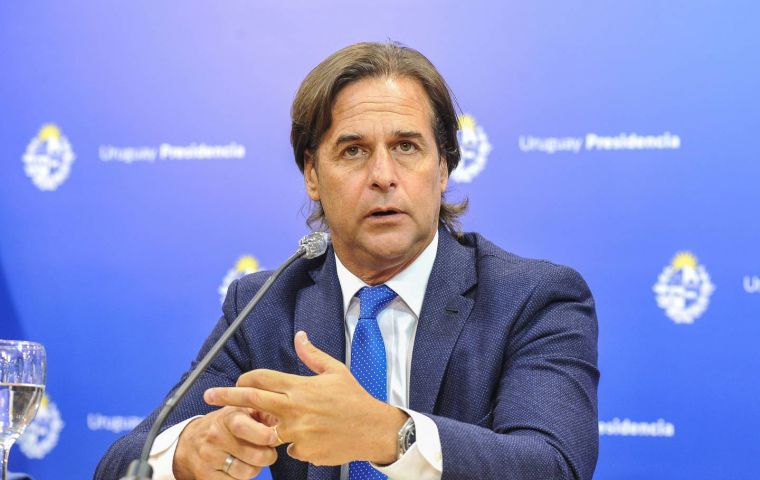MercoPress. South Atlantic News Agency
Uruguayan President highlights differences between his country and Argentina
 “We are a country with one of the oldest political parties in the world,” Lacalle stressed
“We are a country with one of the oldest political parties in the world,” Lacalle stressed Uruguayan President Luis Lacalle Pou Tuesday described what in his opinion were the 4 political differences between his country and Argentina during a symposium hosted by Buenos Aires' daily Clarín called Democracy and Development.
“Uruguayans do not allow excesses from their leaders,” Lacalle underlined during his virtual appearance at the event.
“First, in Uruguay after the dictatorship, governments begin and end,” Lacalle said, meaning that 5-year terms have been completed by one president after another since 1985, including that of his own father.
“Second, transitions are very civilized: as soon as it is known who won the election, the teams start to see how the country is received,” the Uruguayan head of state went on.
Lacalle then highlighted his country's unrestricted respect for the “separation of powers” among branches of Government. “A member of the Executive is not expected to give an opinion on the Judiciary, nor is the Judiciary expected to give an opinion on the Executive,” he went on.
“And fourth, there are national [State] policies that continue” from one administration to the next, regardless of its political allegiance.
But most of all, Lacalle claimed citizens exerted some form of control over their leaders. “Uruguayans do not allow excesses from their politicians, they are very hard and forceful electorally and in their criticism.”
Lacalle also underlined that despite the country's internal debates and differences, “blood does not reach the river,” because dialogue between the different political forces prevails. “Dialogue from the Executive and the ruling party is very important with the other parties and the social forces, even for not agreeing,” he insisted. “For me and for Uruguayan politicians in general, disqualification immediately disqualifies the sender of the disqualification,” Lacalle stressed.
The Uruguayan president then addressed March 27's referendum on the Law of Urgent Consideration (LUC): ”It was a very important law in our country on which we did not agree with the labor union central which promoted [the referendum] or with the largest opposition party which is the Frente Amplio (Broad Front). If you look at the arguments perhaps they were hard and with some chicanery, but the blood did not reach the river and the next day the country was already minding other discussions.“
Lacalle also highlighted the role of political parties. We are not a movementist country, we are a country with one of the oldest political parties in the world, and that allows outraged people to channel their annoyance through the political parties” with Parliamentarian representation.
He also defended his stance regarding Mercosur and Uruguay's drive to flexibilize the trade bloc. “We have over 35, 36, 37% of our foreign trade with China, Argentina is 6, with a trade balance deficit for our country, and Brazil will be 9 or 10. My duty as an Uruguayan is to say 'open up the world to me, if you open up the world to us we are going to do well for sure.”
(Source: Clarín)




Top Comments
Disclaimer & comment rulesCommenting for this story is now closed.
If you have a Facebook account, become a fan and comment on our Facebook Page!